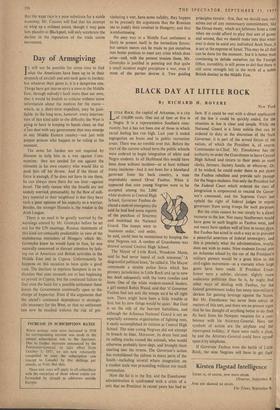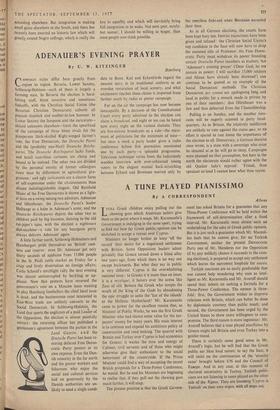BLACK DAY AT LITTLE ROCK
By RICHARD H. ROVERE New York The Mayor of Little Rock, Woodrow Mann, said he had never heard of such nonsense.' 'A disgraceful political hoax,' he called it. The Mayor commands a sizable police force which has primary jurisdiction in Little Rock and up to now has dealt adequately with the town rowdies and louts. One of the white student-council leaders, a girl named Robin Wood, said that 'if Governor Faubus had not sent the troops we'd be all right now. There might have been a little trouble at first, but by now things would be quiet.' But God is on the side of the heaviest battalions, and although the Arkansas National Guard is not an especially awesome organisation of fighting men, it easily accomplished its mission at Central High School. The nine young Negroes did not attempt to breach its lines. Moreover, its drum beat and its rolling trucks roused the animals, who would otherwise probably have slept, and brought them snarling into the streets. The Governor's action has emboldened the yahoos in many parts of the South—including several where integration on a modest scale was proceeding without too much corn motion.
Now the fat is in the fire, and the Eisenhower administration .is confronted with a crisis of a sort that no President in recent years has had to face. If it could be met with a direct application of the law it could be quickly ended, for the situation in law is clear and simple. While the National Guard is a State militia that can be ordered to duty at the discretion of the State Governor, it is part of the armed forces of the nation, of which the President is, of course, Commander-in-Chief. Mr. Eisenhower has the authority to order the Guardsmen to leave Central High School and return to their posts as store clerks, farmers, factory hands, or whatever. Or, if he wished, he could order them to put down the Faubus rebellion and provide safe passage for the Negro students. Not only the President but the Federal Court which ordered the start of integration is empowered to rescind the Gover- nor's command; and the Supreme Court has upheld the right of federal judges to enjoin governors from using troops for such purposes.
But the crisis cannot be met simply by a direct recourse to the law. Not many Southerners would have gone to such lengths as Faubus went, and not many have spoken well of him in recent days. But Faubus has acted in such a way as to provoke a powerful assertion of federal sovereignty, and this is precisely what the administration, wisely, does not wish to make. Nine students forced into an Arkansas school by the use of the President's military powers would be a great blow to the civil-rights movement—at a moment when large gains have been made. If President Eisen- hower were a subtler, cleverer, slightly more audacious politician than he is, he might find other ways of dealing with Faubus, for the federal government today has many non-military devices for gaining leverage against the States. But Mr. Eisenhower has never been adroit in matters of this sort, and there are no present signs that he has thought of anything better to do than fly back from his Newport vacation for a con- ference with his Attorney-General. Here the symbols of action are the airplane and the interrupted holiday; if there were really a plan, he and the Attorney-General could have agreed upon it by telephone.
If Governor Faubus wins the battle of Little Rock, the nine Negroes will have to get their schooling elsewhere. But integration is making small gains elsewhere in the South, and there has recently been enacted an historic law which will greatly extend Negro suffrage, which is really the key to equality and which will inevitably bring full integration in its wake. Not next year, surely; but sooner, I should be willing to wager, than most people now think possible.



































 Previous page
Previous page